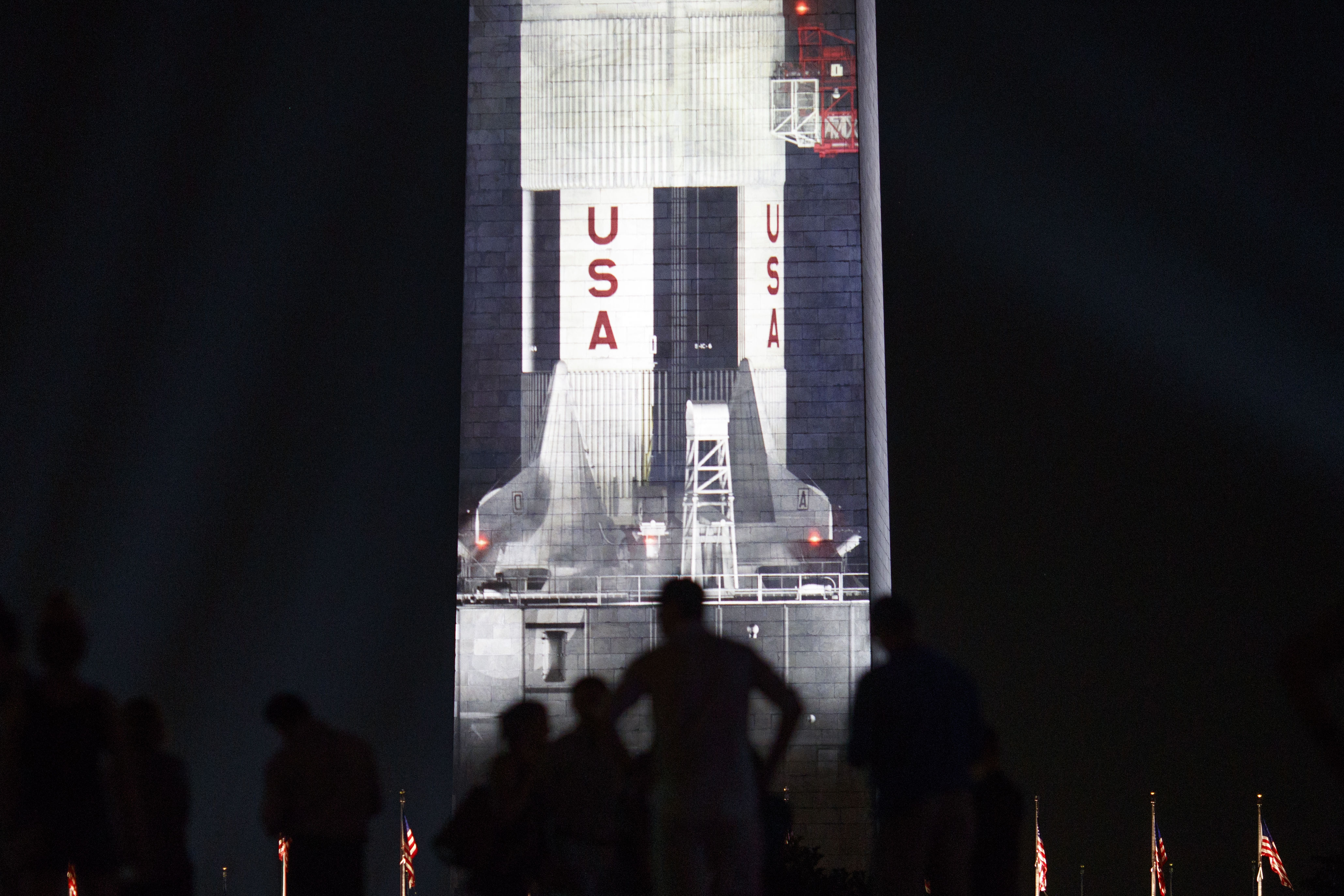Create a free profile to get unlimited access to exclusive videos, sweepstakes, and more!
NASA and Apollo 11 crew commemorate 50th anniversary of mankind’s giant leap

Except for Buzz Aldrin and Michael Collins, no one living on Earth today know what it’s like to be humanity’s first waystone, lifting our eyes to see how far our space dreams can take us. And on the 50th anniversary of the Apollo 11 mission that took America to the moon, the two legends reunited to commemorate one of history’s truly singular occasions, ahead of a full celebration at NASA’s Kennedy Space Center.
In addition to a full slate of nationwide events that even included a spectacular nighttime projection of the Saturn V rocket on the Washington Monument (seen above), NASA commemorated the Apollo 11 launch with a new video that adds some flair to the original 1969 countdown. You can relive the spine-tingling liftoff by checking out the mighty rocket firing its massive thrusters, with the Apollo 11 crew aboard, below:
Original moon walker Neil Armstrong passed away in 2012, but his two Apollo 11 team members typified the early space program’s hard-edged mentality as they bantered back and forth with President Donald Trump at the White House on the eve of the Apollo 11 launch anniversary.Aldrin, now 89, groused that the U.S. has been lagging since those early Apollo missions, according to the Associated Press: “We have the number-one rocket right now in the U.S. and we have the number-one spacecraft, and they cannot get into lunar orbit with significant maneuvering capability.” Collins, meanwhile, restated that he’d rather see the U.S. bypass its current moon plans in favor of a “Mars direct” program to set foot on the red planet sooner rather than later.
At Saturday’s celebration, held at the Apollo 11 launch site at NASA’s Kennedy Space Center, Vice President Mike Pence said humanity’s first moon visit is the sort of watershed moment that people will still commemorate hundreds of years from now — long after the myopia of our other present affairs has lapsed from history’s memory.
“Apollo 11 is the only event in the 20th century that stands a chance of being widely remembered in the 30th century,” said Pence, via Space.com. “A thousand years from now, July 20, 1969 will likely be a date that will live in the minds and imaginations of men and women, as long as there are men and women to remember — across this world, across this solar system and beyond.”
Collins didn’t attend the celebration in Florida, but Aldrin was there, and he drew a standing ovation during Pence’s speech, with the audience rising to recognize not only Aldrin and his crewmates, but all the people who toiled to bring the Apollo 11 program to life.
Pence, who chairs the newly-revived National Space Council, also revealed during his remarks that NASA’s Orion crew capsule — the next-generation vessel designed to transport humans not only to the moon, but eventually to Mars — “is complete and ready to begin preparations for its historic first mission,” according to Fox News. It’s a key milestone in the Artemis program — NASA’s successor to the Apollo program, which aims to make one of the agency’s 12 current female astronauts the next human to set foot on the moon’s surface.
NASA even gave a serendipitous shoutout to the here and now, congratulating the crew of the Russian Soyuz capsule on making a well-timed, anniversary-day journey to the International Space Station. In addition to two Russian astronauts, the successful Soyuz launch also carried American astronaut Andrew Morgan to the ISS on his first-ever space mission, according to ABC News.
NASA is capitalizing on the momentum of its pivotal anniversary in the hope of enticing a new generation of would-be explorers, as well as to keep public passion strong in support of its ambitiously-scheduled Artemis program. The agency maintains its goal of putting a woman on the moon within the next five years, and its Apollo 11 50th Anniversary website is loaded with videos, photos, and background information about its ongoing space dreams — not only here in the present, but also from half a century ago.














